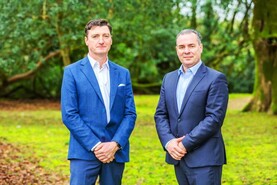Carbery, the leading milk price umbrella co-operative for the four west Cork co-ops based out of Ballineen in west Cork, announced annual results for 2023 this week.
The results are similar to other co-ops, down on the exceptional 2022 results, but relatively strong, as it openly supported milk price to suppliers by sharing out a €20 million stability fund it had created.
On Wednesday, Ornua, the umbrella co-op for eight member co-ops in Ireland that among other activities trades butter internationally under the Kerrygold brand, also announced its 2023 results.
Kerrygold is rather uniquely achieving a premium price for a commodity on international markets because it has a grass-fed story behind it.
More specifically, it has a real point of differentiation in that it is a soft yellow butter compared to the hard white butter that you get when butter is made from milk from cows that are predominantly fed indoors on conserved feeds and concentrate.
Irish butter is made from cows grazing fresh grass, and that is the single key point of difference. The Ornua financial results, similar to the Carbery results, followed a similar downward trend relative to 2022, when commodity prices hit highs nobody ever expected.
Premium
However, the core premium producing Ornua business remains solid when you allow for the various global market movements.
Ornua has a pricing structure with its members that rewards quality. So if the product specification from its members hits a standard, the returns to the milk processor are improved.
The fundamental change in direction of Ornua to get involved in milk processing over ten years ago in Kerrygold Park in Michelstown, now means that Ornua has capacity to produce over 80,000 tonnes of butter at this facility.
Currently it is doing half this amount. So the building blocks for more control, quality and premium are in place – now all it needs is the raw product.
So to stand back from the detail, in both Carbery and Ornua the annual financial results are based on something different that the rest of the world can’t deliver.
However, the 2023 results do nothing to recognise what is happening at farm level as the rug is being pulled from under farmers.
A downward pressure on stocking rate coupled with non-market incentives are driving change.
Small tweaks
What might seem like small tweaks have the potential to be much more damaging to future results for the likes of Carbery and Ornua.
Ironically, this change at farm level in how milk is produced could erode the very basis of the unique characteristics Kerrygold has.
Ultimately, this is down to the milk suppliers in west Cork and other parts of Ireland that will be forced to produce more milk from conserved forages and concentrates than grazed grass.
This is not to absolve milk suppliers of wrongdoing on nutrient management. Farm practice must improve, and the majority are continuously improving and investing.
However, imposing an EU-derived political consensus decision on stocking rate, on a part of the EU that can utilise nutrients differently and efficiently to others, is not in the best interests of Irish farmers.
A key question remains – who owns this problem? Neither of the two powerhouses we met this week are directly involved in owning it, yet both are utterly dependent on the result.
Ornua, while completely dependent on the product from its shareholders, is at arm’s length from the suppliers. Carbery, similarly, is the umbrella for the west Cork co-ops, and probably feels the individual co-ops are more responsible for this one.
The Minister and other politicians can talk positively about supporting farmers, but the battle for land use continues, and actions speak louder than words.
Instead of balance between sectors, policies are only furthering the existing imbalance. We have significantly less tillage and sucklers.
We have more grassland taken by dairy farmers to dilute paper stocking rates, sending them in the wrong direction, and huge non-market led subsidies to some sectors that create more distortion.
The fact everybody has responsibility might actually mean nobody is taking responsibility and what happens, just happens. What happens on Nitrates will be the defining policy decision of this decade at least facing all farmers.
Circular food
Last week at a gathering of global scientists in Belfast, Teagasc director Frank O’Mara, in his position as chair of the European Animal Task Force outlined the case for livestock to be part of a sustainable circular food system.
He suggested that efficiency can be good, but it might not measure circularity, biodiversity, soil quality and social aspects.
Ireland has a lot of these qualities, but again the direction of travel is further away from some of these.
So we must fight to preserve what is good and reduce the pressures. Reducing stocking rates is not the singular solution.
If other European countries can get a ground rule change to allow outputs from anaerobic digesters be allowed offset purchased nutrients, then Ireland deserves change.
We should be able to negotiate change to allow small scale, family, grass-based farming and tillage continue in a balanced, sustainable way and be more efficient in the wider sense.






 This is a subscriber-only article
This is a subscriber-only article










SHARING OPTIONS: